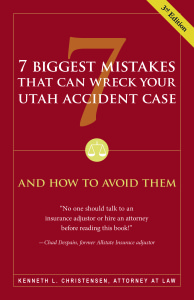No one is perfect. We have all made mistakes, been in accidents, or experienced injuries in the past. Sometimes the circumstances surrounding injuries and accidents can seem embarrassing or trivial. Under many circumstances, it’s fine to keep the secret, but when it comes to your personal injury case, keeping quiet about the past can be harmful.
Table of Contents
Common Thinking
- I know what you are thinking, “Do I really have to tell my attorney about that time when I ran into a parked car and broke my wrist while riding a bike? It is kind of embarrassing and I doubt that it really matters” The answer is yes. What you may see as embarrassing and unimportant could be used against you by the insurance company. Once a case begins, the opposing side is allowed to look into your medical past and accident history. This allows your attorney to know the details of everything that the opposing side could find so that he can plan a way to defend against any attacks that may involve that injury.
- Another common line of thinking is that a past injury’s relevance comes with an expiration date. For instance, you may have hurt your neck thirty years ago after falling out of a tree when you were seven years old. Now you are almost forty and you have hired an attorney to help you work with your insurance company following a car accident in which you re-injured your neck. If you don’t inform your attorney about the time when you fell out of a tree, the insurance company could go back through your records and use the information from your fall to claim that your current neck injuries are a result of falling from a tree thirty years ago and not from your recent car accident.
- Sometimes previous injuries or accidents aren’t the problem. There are times when someone is injured in multiple places during an accident, or they have injuries that don’t manifest themselves until several weeks later. In these types of cases, some people are tempted to think, “Well that’s just a minor injury,” or “I don’t want to to sound like I am complaining, so I will just tell my attorney about the main injuries and not worry about some of the minor ones.” The problem with this line of thinking is that hiding injuries can negatively affect the amount of compensation you are awarded, and injuries that you may now count as minor may end up being serious and costing more than you thought they would. And by declaring an injury late in the case that you should have revealed early on, you can risk losing credibility and therein severely hinder your ability to receive full compensation.
#4 From the 7 Biggest Mistakes
 In the book, 7 Biggest Mistakes That Can Wreck Your Utah Accident Case, the number four most common mistake is hiding past accidents and injuries from your attorney. The book reads:
In the book, 7 Biggest Mistakes That Can Wreck Your Utah Accident Case, the number four most common mistake is hiding past accidents and injuries from your attorney. The book reads:
The entire insurance industry maintains an extensive database of people who have been in prior accidents or asserted claims. If you try to hide a prior accident history, either from your attorney or the insurance company, it can severely damage your case if not destroy it … The same is true for prior injuries and medical care. If you saw a doctor before the accident you can bet there is a written record (i.e., chart note) that the insurance company will find. Do not hide anything. Do not decide what you think your attorney should know. If your attorney knows about your prior medical history in the beginning, then he or she can do something about it or at least manage the case in an appropriate way to minimize its damaging effects on your current case. But if you hide this information and your attorney finds out later, you will either lose your case or receive substantially less. (30)
Attorney-Client Privilege
Under Utah Courts’ rule 1.6, comment 2, it reads:
A fundamental principle in the client-lawyer relationship is that, in the absence of the client’s informed consent, the lawyer must not reveal information relating to the representation. See Rule 1.0(e) for the definition of informed consent. This contributes to the trust that is the hallmark of the client-lawyer relationship. The client is thereby encouraged to seek legal assistance and to communicate fully and frankly with the lawyer even as to embarrassing or legally damaging subject matter. The lawyer needs this information to represent the client effectively and, if necessary, to advise the client to refrain from wrongful conduct.
You Can Trust Us
At Good Guys Injury Law, the people we help mean more to us than anything else. We want our clients to feel comfortable when they come to us for help. We respect them and the experiences they have gone through, we desire their trust, and we always seek to develop a friendly relationship that will last much longer than the case that brought us together.
In the unfortunate case where an attorney isn’t motivated by the well-being of his client, there are strict penalties which the individual states’ bar associations will enforce on a lawyer who is found in violation of attorney-client privileges. The Legal Dictionary lists possible punishments as “private reprimands; public censure; suspension of the ability to practice law; and, most severe of all, disbarment—permanent denial of the ability to practice law in that jurisdiction.”
Tell me the truth, the whole truth … and let me make the best of it.
“The value of a case rests largely upon an accident victim’s ability to demonstrate – in a convincing manner – the extent to which the accident has affected his or her life. Credibility is key! Do not jeopardize your case by failing to disclose everything. All I ask of a client is this: Tell me the truth, the whole truth … and let me make the best of it” (7 Biggest Mistakes p. 31).
Photo copyright to Aqua Mechanical
